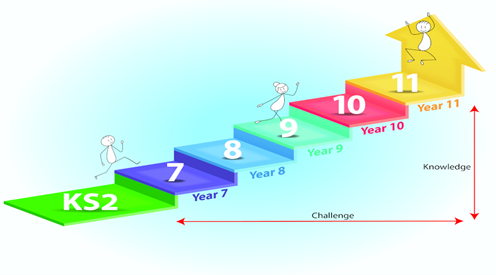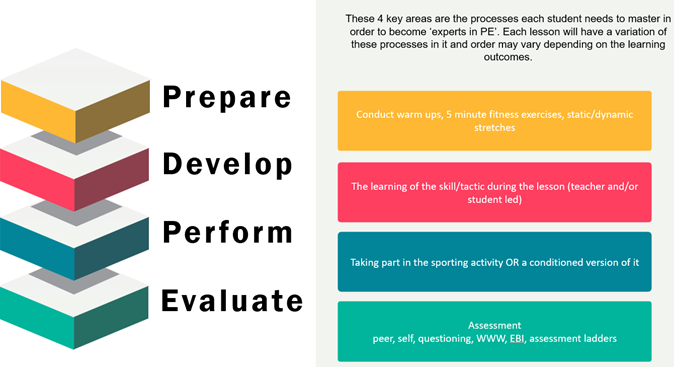Physical Education
Moving from Primary to Secondary
From Key Stage 2 we look identify gaps in PE specific knowledge and skills in order to develop sportsmen and sportswomen. We look to develop fundamental motor skills alongside building on communication, resilience and teamwork.
Creating Subject Experts
We want our learners to become great sportsmen and women.
Our learners practice and improve their disciplinary skills across a range of sporting activities, to prepare them for their world in their time. Through offering a range of sporting activities we aim to inspire and enthuse our students to participate in physical activity for a lifetime. We carefully select our activities to ensure students have the opportunity to participate in a range of challenging yet accessible sports that equip them with the skills that lead into lifelong participation.
Our curriculum is carefully sequenced and interleaved to allow for the practice of our key disciplinary skills across these activities within KS3. Alongside this our assessments across each year help to support our learners progress in their learning.
Subject Disciplines (Skills)
Subject Substantives (Knowledge)
While interleaving our PDPE disciplines into our curriculum, we practice these skills using our subject substantives. These golden threads allow our sportsmen and women to improve using progressively challenging practice of the PDPE disciplines.
Across key stage three, our learners will build knowledge around a range of activities. These subject substantives include:
- Outwitting Opponents
- Accurate Replication
- Performing at Maximum Levels
- Net/Wall
- Striking and Fielding
- Problem Solving
Roadmap
Image to follow
Deepening Information
Our PDPE disciplines are taught cumulatively across key stage three and interleaved constantly across the substantive subject threads. This allows our sportsmen and women to deepen their knowledge, understanding and expertise. For example, they will begin key stage three understanding a range of fundamental motor skills across a variety of activities. They will develop a range of skills that can be applied across a range of activities. Our learners will then deepen their skills through immersing themselves in performing these skills in a variety of different games.
How we assess your child
Assessment Grades KS3
Students complete assessments in each of their subjects at key points during the year which test their understanding of all the knowledge they have learnt to date (we call these cumulative assessments). We grade these assessments on a scale from 1-9 (9 being the highest). The assessments are designed so that each year they become more challenging and test students on their growing bank of knowledge.
Therefore, as an example, if your child achieves a grade 5 in an assessment in Year 7, we can predict confidently that they should go on and achieve at least a grade 5 at GCSE. This is providing they keep working hard and progressing. Please note: this prediction states “at least”. Students often achieve higher than this.
In years 7 – 9, in practical subjects (PE, Drama, Music etc.), we assess students on their practical ability and skills. This gives us a strong indication of how successful they would be if they chose one of these subjects as a GCSE option. However, in order to get a fuller view of their potential success, it is also important to consider their grades in the core subjects. This is because there is often a literacy, numeracy, or scientific element to the courses.

Assessment Grades in KS4
Students complete mock exams in each of their subjects at key points during the year which test their understanding of all the knowledge they have learnt to date. We grade these mock exams on a scale from 1-9 (9 being the highest). In the report you will see:-
- Target Grade: This is based on a student’s past performance. It is an aspirational but achievable target
- Mock Grade: The grade they achieved in the mock exam
- Predicted Grade: The grade a teacher believes a student will achieve in the final exam, if they maintain their current ATL and performance
Assessment Grades in KS5
Students complete mock exams in each of their subjects at key points during the year which test their understanding of all the knowledge they have learnt to date. We grade these mock exams on a scale from A*-E/Distinction* - Pass. In the report you will see:-
- Target Grade: This is based on a student’s past performance. It is an aspirational but achievable target
- Mock Grade: The grade they achieved in the mock exam
- Predicted Grade: The grade a teacher believes a student will achieve in the final exam, if they maintain their current ATL and performance
Exam Board Information
|
OCR Cambridge National – Sports Studies
GCSE PE
|
||||||||||||||||




